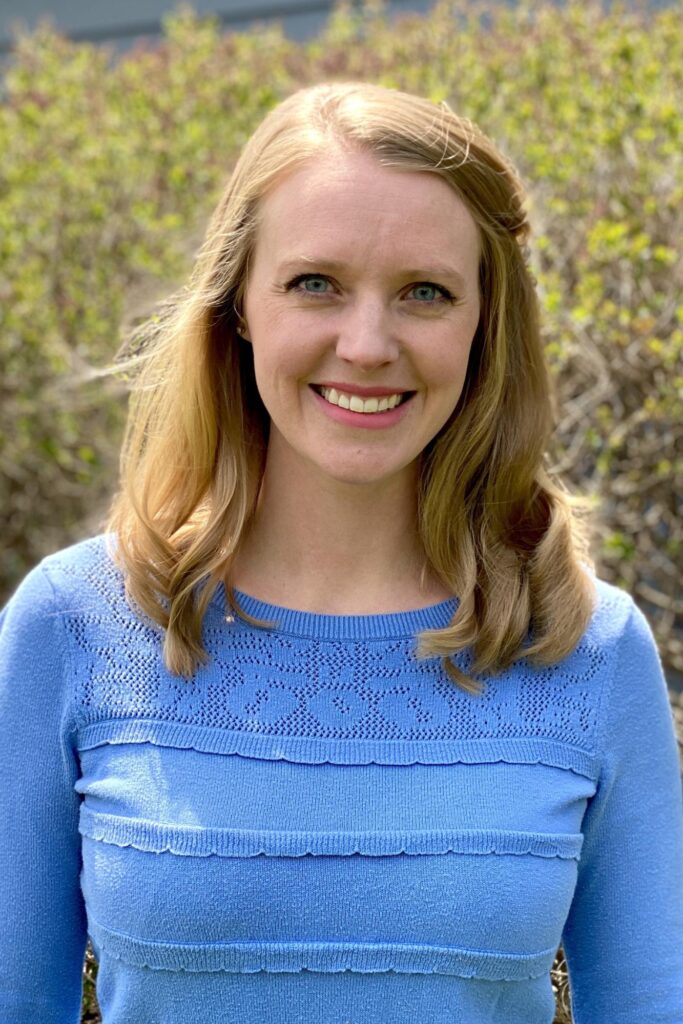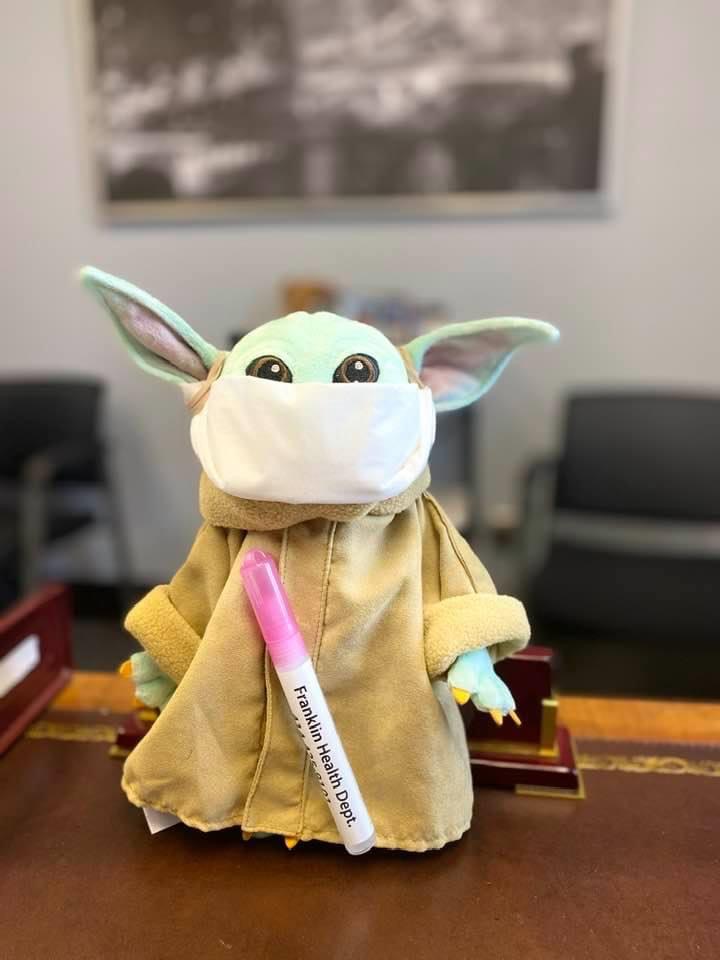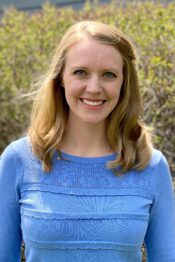How Skill, Determination, and a Baby Yoda Help Nurses Provide Exceptional Care: Wisdom from Julianna Manske, Public Health Nurse
- By: The Public Health Learning Network
- Date
 The Covid-19 pandemic has presented a series of complex challenges for public health nurses, and we took some time to connect with Julianna Manske, who works in the Milwaukee metropolitan area–one of the hardest-hit areas in the Midwest with more than 5,000 confirmed cases and 252 deaths as of May 27, 2020. Those numbers represent slightly less than half of the cases and nearly two-thirds of the deaths in the state of Wisconsin. Our conversation has been lightly edited for length and clarity.
The Covid-19 pandemic has presented a series of complex challenges for public health nurses, and we took some time to connect with Julianna Manske, who works in the Milwaukee metropolitan area–one of the hardest-hit areas in the Midwest with more than 5,000 confirmed cases and 252 deaths as of May 27, 2020. Those numbers represent slightly less than half of the cases and nearly two-thirds of the deaths in the state of Wisconsin. Our conversation has been lightly edited for length and clarity.
Can you talk about where you work and your role in the COVID-19 response?
I work for the City of Franklin Health Department. We are a suburb of Milwaukee County. My role as a Public Health Nurse during the COVID pandemic is primarily contact investigation. We follow up with every individual diagnosed with COVID in Franklin.
We also conduct contact tracing with each case and follow up with the clients’ close contacts to ensure they do not develop any symptoms, and if they do, help them seek medical care or testing, if indicated. Another important role during the response is educating clients and the general public about how to keep themselves healthy and prevent the spread of infection. We recently created a Facebook page which has been a convenient method of reaching the general public with truthful and up-to-date information.
What has been the most challenging or difficult professional decision you’ve had to make so far during this pandemic? What has been the most challenging or difficult thing you’ve experienced so far in your work during this pandemic?
The most challenging and rewarding situation during this pandemic was with my very first Covid client. This particular client had recently returned from a conference in a different state, and her close contacts resided in three other states. And of course, we received the lab results on a Saturday afternoon. I was struggling to find an off-hour contact for Georgia. I remembered I had a colleague whom I met via APHN and reached out to her asking for help. She was immediately able to connect me with the right person, who reached out Sunday morning so I could relay the close contact information. This was one of those “it’s not what you know, but who you know” situations and a pretty remarkable connection proving that being a part of professional organizations pays off!
What are you most concerned about right now personally and professionally?
Julianna: My mother in law is a hairstylist, so I feel like I have a personal connection to the salon/spa debate. On one hand, I understand the need for all small businesses, including salon owners, to open so they can keep their business afloat, and to generate income, as most salon owners do not qualify for unemployment. I also understand the desire for people wanting their hair done— having someone wash, cut, and style your hair makes you feel beautiful, and during this time of isolation from our friends and family, anything to improve our mental health is important.
Unfortunately, the virus isn’t just about “you”, it affects every person you come into contact with. Most people do not have the unique opportunity that I have to talk with people diagnosed with Covid seven days a week, since mid-March. They don’t hear the firsthand reports of people who feel that their lungs are burning with every breath, or becoming short of breath from just walking to the bathroom. They haven’t been confined to bed with fevers that first make them shake with chills, then sweat through their bedsheets. They haven’t had to ease a tearful mother’s distress from being isolated from her four young girls, or only be able to text with the 22-year-old kid because it hurts too much to actually speak on the phone, or help the worried elderly woman get a hot meal delivered because she is so tired trying to take care of her husband she doesn’t have time to cook anything for herself. This virus affects people’s bodies, families, workplaces, homes, mental health, and overall life. People need to understand that this is not a political game, this is a matter of health and safety.
Now that salons are open in Wisconsin, I worry for the health and safety of my mother-in-law and the volume of people that come in and out of her building. Some people I talk with describe their symptoms starting as “ just allergies” but as symptoms progress, they test positive for COVID. It worries me that someone might be unintentionally putting her a risk. I take comfort in the fact that the building owner has put prevention measures in place like removing seating in the waiting room and positing signage. She also is wearing a mask to decrease her risk. I just pray her clients, and all people going to salons, wear a mask and cancel their appointments when they don’t feel well, even if it’s “just allergies”.
This virus affects people’s bodies, families, workplaces, homes, mental health, and overall life. I see people sharing petitions about “one client at a time.” It doesn’t matter if a stylist sees one client at a time. It matters how many people they have in their circle of close contacts, and the more people the stylist is around, the more that stylist, the stylist’s family, and all their clients and families are at risk.
What concerns you about the days and weeks to come?
I’m most concerned about how to “be normal” again after the outbreak. Personally, it’s going to be challenging for me to learn to “re-respect” individuals based on their actions and social media posts. I know everyone is entitled to their opinion, and we all have different opinions depending on where we are sitting, but many of the people I see blatantly disregarding the stay-at-home guidelines haven’t been personally affected by someone diagnosed with Covid. It’s also going to be hard for me to be around certain people knowing that they have disregarded the stay-at-home guidelines, so even when gatherings are allowed, I’m hesitant to see them as I know they haven’t been safe at home.
What gives you hope at this time?
As cliché as this sounds, Wisconsin’s spring has started to bud; tulips are blooming, my lilac tree has itty bitty lilacs on it, my two boys want to spend every waking minute outdoors in the sunshine, and that fresh growth reminds me that this virus will pass, and we will prevail.
I am also following vaccine studies and am hopeful that with clinical trials happening now and over the summer, we may have a viable vaccine by fall! Fingers crossed!

How are you staying connected with coworkers and colleagues? What about family and friends?
I have been relying heavily on technology and using video conferencing to stay connected with family and friends. I recently had a Zoom conference with 11 of my old high school friends that live across four different states. We’d been trying to coordinate a date for an in-person reunion for the last eight months but couldn’t find a date that worked for everyone. Never thought I’d say this, but Covid to the rescue because since everyone’s plans were canceled, we finally agreed on a date and time to hop on Zoom and catch up with each other.
What words of encouragement do you have for the public health workforce?
This is our time to shine. Most people forget public health exists because if we’re doing a good job, our communities are happy and healthy. Public Health is saving lives—hundreds and thousands of lives are saved by the work we do containing and preventing the spread of COVID.
Our work is vital and important, and while we still are not being as recognized as we should be, it is the heart of the public health workforce making a difference in our communities. Also, not to brag or anything, because all nurses are important and I have the deepest respect for my colleagues and friends fighting on the front lines, but while acute care nurses are saving one life at a time, public health nurses are saving 10 times that by preventing people from getting sick in the first place. Talk about being a superhero!

 Subscribe To Our Communications
Subscribe To Our Communications